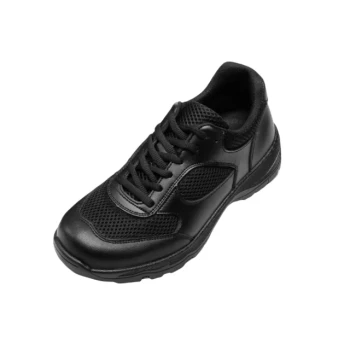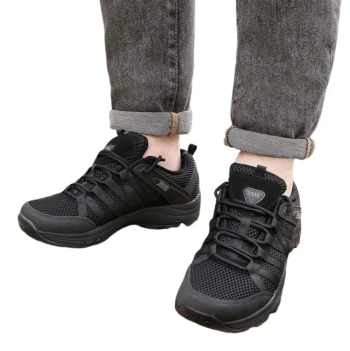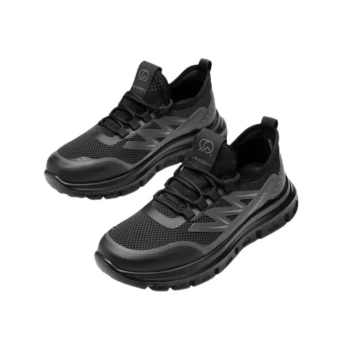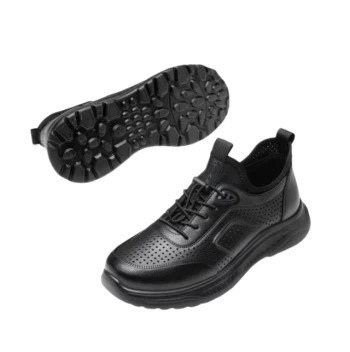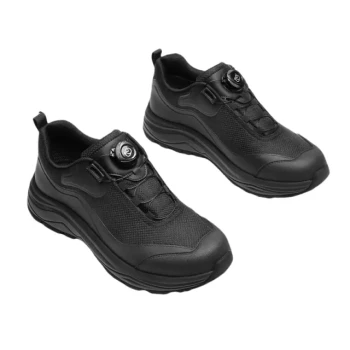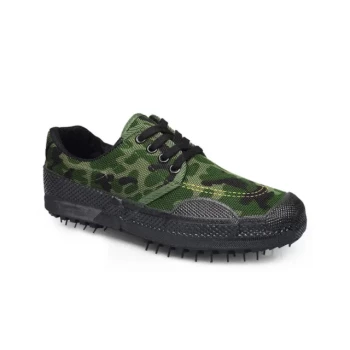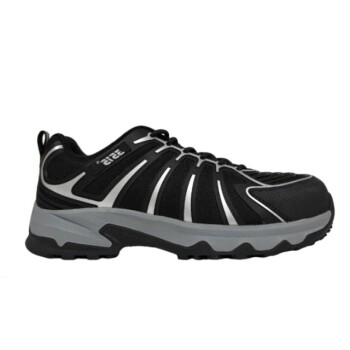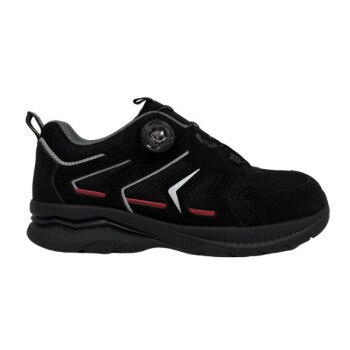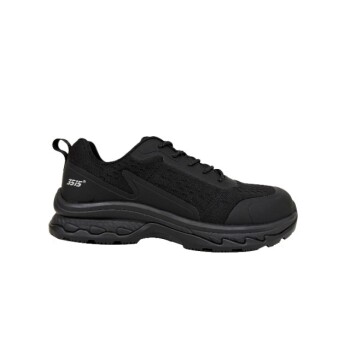At its core, a sustainable sneaker is defined by its entire lifecycle, not just its final appearance. This means it is constructed from organic or recycled materials, avoids virgin non-degradable plastics and harmful chemicals, and is built to be durable. The manufacturing process itself must also be clean, with reduced carbon emissions, no water pollution, and a commitment to being cruelty-free.
True sustainability in footwear goes beyond using recycled materials. It is a comprehensive philosophy that scrutinizes every step of the supply chain, from the ethical treatment of workers to the long-term durability and environmental impact of the final product.
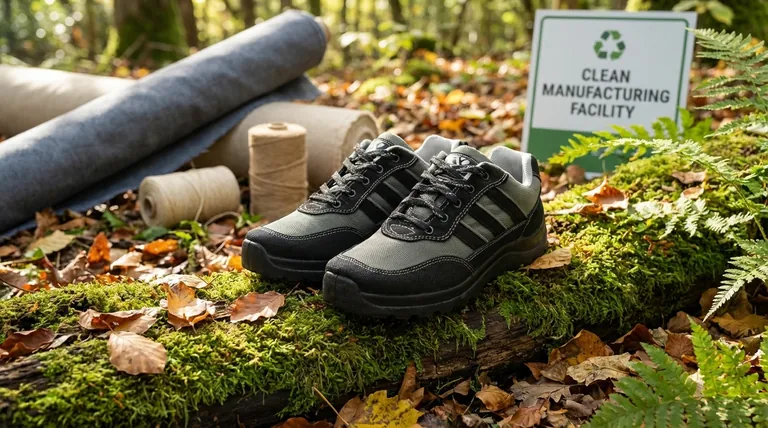
The Foundation: Materials and Composition
The materials used to construct a sneaker are the most visible aspect of its sustainability. This is about choosing renewable and safe resources while actively avoiding harmful ones.
Recycled and Organic Materials
The primary goal is to move away from resource-intensive virgin materials. This often involves using recycled plastics (like rPET from bottles) for uppers, organic cotton for linings, and natural rubber for soles.
Avoiding Virgin Synthetics
A key characteristic is the strict avoidance of new, non-degradable plastics. These petroleum-based materials contribute to fossil fuel consumption and persist in the environment for centuries after the shoe is discarded.
Eliminating Harmful Chemicals
Sustainable brands ensure their products are free from hazardous substances. This includes the dyes, glues, and finishing agents, which can harm both the factory workers and the planet's ecosystems.
Beyond the Shoe: Production and Ethics
A truly sustainable product cannot be created through an unsustainable or unethical process. The integrity of the manufacturing and supply chain is just as important as the materials themselves.
Low-Impact Manufacturing
This involves a commitment to reducing carbon emissions through energy-efficient production methods. Brands often measure and report their carbon footprint as a sign of transparency and a commitment to improvement.
Protecting Water Resources
Conventional textile dyeing and footwear production can be incredibly polluting to waterways. A sustainable characteristic is a closed-loop system or advanced treatment process that ensures no water pollution results from manufacturing.
Ethical Labor Practices
Sustainability includes people. This means guaranteeing fair labor practices and safe working conditions for every person in the supply chain, from the material sourcing to the final assembly.
Cruelty-Free Commitment
A core tenet for most sustainable brands is a strict no-animal-harm policy. This extends from an absolute ban on animal testing to avoiding animal-derived products like conventional leather and certain glues.
A Critical, Often Overlooked Trait: Durability
In the fight against waste, longevity is a powerful tool. A sustainable sneaker is not a disposable item but a product built for a long and useful life.
The Problem with Fast Fashion Footwear
The conventional footwear model often prioritizes low costs and rapid trend cycles, leading to poorly made shoes that are quickly discarded. This generates immense waste and drives constant overproduction.
Longevity as a Core Feature
By contrast, sustainable sneakers are characterized by durable construction. A shoe that lasts for years instead of a single season dramatically reduces the consumer's environmental footprint by lowering the need for replacement pairs.
Understanding the Trade-offs
Pursuing sustainability involves navigating a complex landscape of choices, and no single product is perfect. Understanding these compromises is key to making an informed decision.
The "Perfect" Sneaker is a Myth
One brand might excel at using recycled materials but have a complex global supply chain, while another might have an impeccable ethical record but use less durable components. It's about progress, not perfection.
Cost and Accessibility
Ethical sourcing, fair wages, and innovative, eco-friendly materials often come at a higher cost. This can make truly sustainable sneakers more expensive and less accessible than their mass-produced counterparts.
Performance vs. Planet
For highly specialized athletic footwear, some of the highest-performing materials are still synthetic and derived from fossil fuels. Brands are constantly innovating, but a trade-off between peak performance and maximum sustainability can sometimes exist.
Making the Right Choice for Your Goal
Your personal priorities will guide you to the brand that best aligns with your values. Use these characteristics as a framework for evaluating your options.
- If your primary focus is environmental impact: Prioritize sneakers made from a high percentage of recycled or bio-based materials with transparent reporting on carbon emissions.
- If your primary focus is ethical treatment: Look for certifications and clear statements about fair labor practices, safe working conditions, and supply chain transparency.
- If your primary focus is reducing waste: Choose brands that emphasize durable construction, offer repair programs, or design their shoes for easy disassembly and recycling.
Ultimately, a sustainable sneaker empowers you to make a choice that is better for the planet and its people.
Summary Table:
| Key Characteristic | Core Focus |
|---|---|
| Materials & Composition | Recycled/Organic materials, avoids virgin synthetics & harmful chemicals. |
| Production & Ethics | Low-impact manufacturing, water protection, fair labor, cruelty-free. |
| Durability & Longevity | Built to last, countering fast fashion waste. |
| Understanding Trade-offs | Navigating cost, performance, and accessibility in sustainable choices. |
Ready to Produce High-Quality, Sustainable Footwear?
As a large-scale manufacturer, 3515 produces a comprehensive range of durable and eco-conscious footwear for distributors, brand owners, and bulk clients. Our production capabilities encompass all types of shoes and boots, and we are committed to helping you integrate sustainable practices into your product lines.
We help you:
- Source and utilize recycled and organic materials.
- Implement cleaner, low-impact manufacturing processes.
- Build durable products that reduce waste and enhance brand value.
Let's collaborate to create footwear that is better for business and the planet.
Contact our team today to discuss your sustainable footwear production needs.
Visual Guide
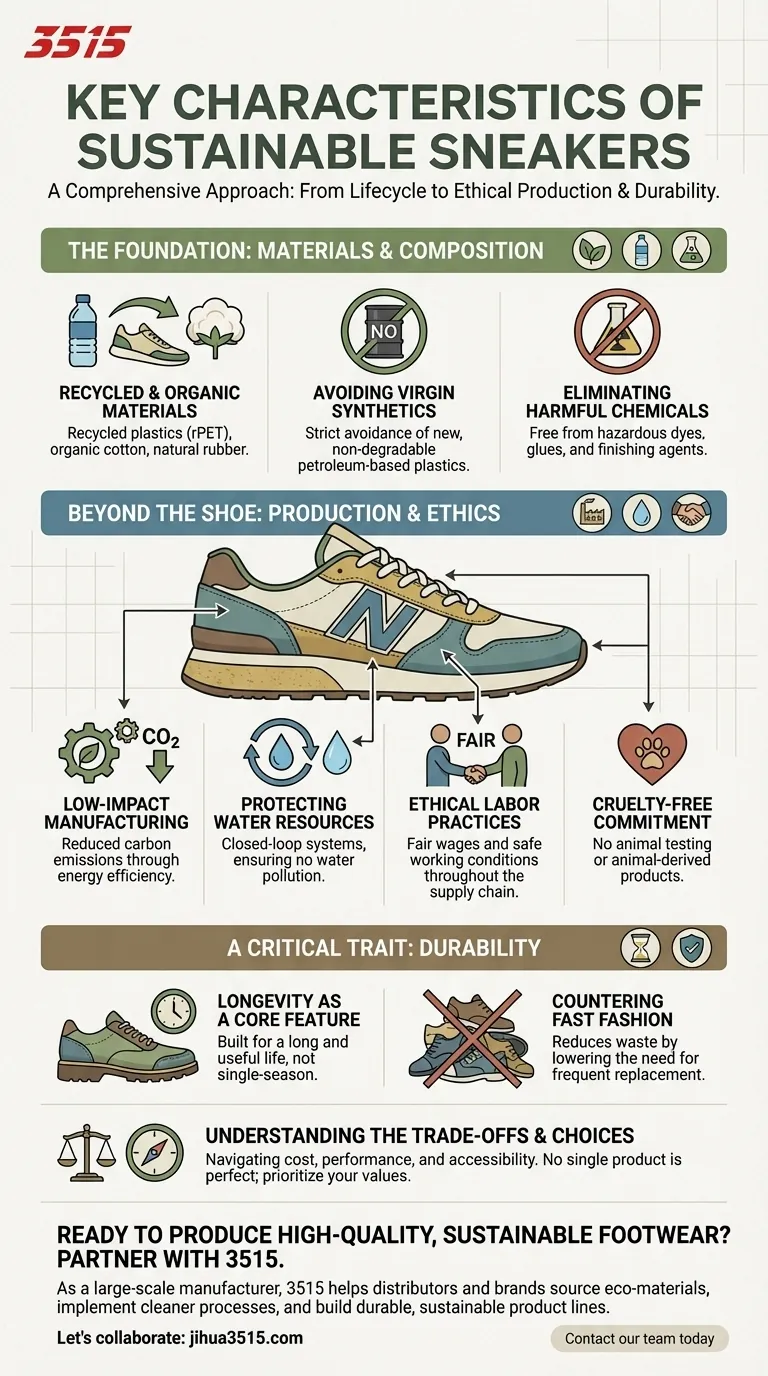
Related Products
- Durable Rubber-Soled Utility Shoes for Wholesale & Custom Brand Manufacturing
- Wholesale Durable & Breathable Training Shoes for Custom Brands
- Lightweight Breathable Training Shoes for Wholesale & Custom OEM Manufacturing
- Wholesale Smart Casual Sneakers with Dial Closure | Factory Direct Manufacturing
- Wholesale Lightweight Cushioned Athletic Sneakers for Custom Bulk Production
People Also Ask
- Which type of sole is better for premium sneakers and why? The Definitive Guide to Rubber Outsoles
- What are the main applications of vulcanized rubber? Unlock Durability for Tires, Footwear & More
- What historical breakthrough in 1844 contributed to modern shoe sole manufacturing? The Vulcanization Revolution
- What are rubber soled shoes? The Ultimate Guide to Durable, All-Weather Footwear
- Why should we wear rubber soled shoes? Unlock Superior Safety and Durability

